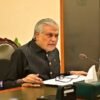Tehran: As tensions with Israel intensify and pressure from the White House grows, Iranian Supreme Leader Ayatollah Ali Khamenei has transferred key authority to the Supreme Council of the Iranian military, including the Islamic Revolutionary Guard Corps (IRGC), Iran Insight reported.
This move follows claims that Khamenei has been moved to an underground bunker in northeastern Tehran, accompanied by close family members, including his son Mojtaba, according to a report by Iran Insight.
Under Iran’s system of government, Khamenei has supreme command of the armed forces, the power to declare war, and can appoint or dismiss senior figures including military commanders and judges.
Distinct from Iran’s conventional armed forces but officially part of the state, the Islamic Revolutionary Guard Corps (IRGC) maintains its own army, navy, air force, and intelligence division. It operates under the direct authority of Supreme Leader Ayatollah Ali Khamenei.
The IRGC has operated as an elite military force loyal to Iran’s Supreme Leader since its formation following the 1979 Islamic Revolution. Its primary mission is to safeguard the Shi’ite clerical leadership and the Islamic Republic’s political system.
The IRGC claims a force of approximately 150,000 personnel across its various branches. It also oversees the Basij, a volunteer paramilitary group known for enforcing internal order and suppressing anti-government protests in support of the clerical regime.
The United States designated the IRGC as a Foreign Terrorist Organisation in 2019, as part of Donald Trump’s policy of applying maximum pressure on Iran during his first administration.
The U.S. State Department said that the IRGC had been directly involved in terrorist plotting, accusing it of killing U.S. citizens and saying Iran was responsible for the deaths of at least 603 American service members in Iraq after 2003.
Trump highlighted Iran’s missile program as a major flaw in the 2015 nuclear deal with world powers, citing its exclusion as a key reason for withdrawing from the agreement in 2018.
The IRGC possesses significant conventional military hardware and capabilities, which it demonstrated through its active role in the conflicts in Syria and Iraq.
Khamenei has deployed the Revolutionary Guards and its affiliated Basij militia to quell national protests in 1999, 2009 and 2022. While the security forces have always been able to outlast demonstrators and restore state rule, years of Western sanctions have caused widespread economic misery that analysts say could ultimately threaten internal unrest.
“His son Mojtaba has grown ever more central to this process over the past 20 years, the sources said, building a role that cuts between the personalities, factions and organisations involved to coordinate on specific issues,” the sources told Reuters.
A mid-ranking cleric seen by some insiders as a potential successor to his ageing father, Mojtaba has built close ties with the Guards, giving him added leverage across Iran’s political and security apparatus, the people added, as reported by Reuters.
“Ali Asghar Hejazi, the deputy of political security affairs at Khamenei’s office, has been involved in sensitive security decisions and is often described as the most powerful intelligence official in Iran,” the sources said.
He has relied on the IRGC not only for domestic security but also to execute regional strategic objectives.
Unlike Iran’s regular army, which operates under the defence ministry and reports to the elected president, the IRGC answers directly to Khamenei.
This direct link has allowed the Guards to acquire the country’s most advanced military equipment across their land, air, and naval divisions, while also granting their commanders significant influence within the state.



